Agenda
Registration and networking breakfast
Opening panel discussion: North America the No.1 destination for infrastructure investing
Over the past couple of years, the U.S. has become a premier destination for infrastructure investment, especially in the fields of energy transition, renewable power generation, and digital infrastructure. The legislative bills passed under the Biden administration have catalysed investment and job growth despite the turbulent economic and geopolitical climate. In this opening panel session panellists will set the scene for 2024 discussing:
- What were the stand-out deals of 2024 and where are the short- and medium-term opportunities?
- What are some of the market high points, and what are the areas to steer clear from?
- Where are current valuation benchmarks?
- What is the future for core infrastructure investing and how resilient will investment be against the current macroeconomic environment?
- What is the likely impact of the 2024 Presidential election on infrastructure investing?
- What does the M&A pipeline hold for 2024 and will political headwinds stymie dealflow?
Morning refreshments and networking break
Keynote presentation: NY Green Bank
In this keynote address, Andrew Kessler, President of the NY Green Bank, will delineate the essential private sector investments required for forthcoming projects aimed at expediting the energy transition in New York State. He will delve into how the Inflation Reduction Act can facilitate crucial investments and throw light onto the obstacles hindering private investment into promising renewable energy and energy efficiency initiatives.
Meeting the energy demand
The North American Electric Reliability Corporation (NERC) recently published a report that cautions about rising forecasts for upcoming energy requirements and a lack of a definite plan for obtaining the necessary power supply. With the U.S. experiencing a revival in its manufacturing industry, and the growth of power-hungry data centres being built to support artificial intelligence technologies, this combination is predicted to drive a substantial rise in energy consumption, far surpassing previous estimates made by grid operators. Also, the expected increase in energy demand may be difficult to meet due to the retirement of power plants and the challenges in bringing new generation and transmission assets online. In this session hear panellists discuss:
- LNG export is booming in the US. What privately financed projects are supporting this sector?
- How has the regulatory environment impacted investment opportunities?
- What practices should be employed when using reporting frameworks?
- What implications do emerging technologies such as AI have?
- How is the US energy matrix changing and where are investors finding conventional and renewable power opportunities?
- The disruption of global politics and its impact on energy prices.
- Impact of climate change and extreme weather.
Renewables: Has the Inflation Reduction Act accelerated investment into US renewables?
The Inflation Reduction Act (IRA) provides incentives worth billions of dollars for renewable energy projects, but there are still major obstacles to connecting new sources of energy to the grid in many areas. The process of planning, securing funding, and obtaining permits for transmission capacity is still extremely difficult and has posed a significant barrier to efficiently delivering energy to areas in need at the necessary times. Could 2024 potentially be the first year in which the renewable energy industry experiences the complete effects of the legislation? In this panel session panellists will review how the IRA is impacting investment into renewable energy projects as they discuss:
- How is volatility affecting returns and how can investors navigate the turbulence?
- What needs to be done to meet the US Dept of Energy challenge of increasing the buildout of renewable energy capacity in the country?
- What are the most lucrative investment opportunities in the renewables sector amidst the current macroeconomic climate?
- Reviewing the Inflation Reduction Act, has it accelerated investment into US renewables? What are the challenges?
- How does renewable energy production contribute to or hinder energy security?
- Has the higher cost of capital from higher interest rates created winners and losers in renewables investment?
- Is the threat of anti-circumvention tariffs a significant concern for the sector?
What are the opportunities & challenges for investors in fibre and telecoms?
Digital infrastructure M&A bucked the downward trend witnessed between 2022 and 2023 when all sectors together saw a drop in trading volume. Digital infrastructure M&A in fact jumped nearly 13% over the same period as Infralogic data shows. Most dealmakers believe 2024 will see even more transactions as fibre seems unable to satiate its appetite for capital and wireless firms seek money for small-cell development.
Attendees will hear from panellists discuss their views on fibre-optics and wireless challenges and opportunities.
- How have investors managed soaring development costs? How has this impacted financing?
- Which fiber-to-the-home opportunities represent beneficial value-for-money?
- Picking opportunities from cableco’s, teleco’s and pure play fiber competition
- Carrier budgets impact on tower and small cell investment
- Structuring equity investments in JVs and other partnerships
- Current lending environment and availability of financing
Networking Lunch sponsored by MUFG
AI, CRE, and zoning – What it all means for data centers
Data center M&A accounted for roughly 34% of all digital infrastructure trading in 2023 – the same proportion as the year before and 2021. That pace is expected to continue as executives seek capital to upgrade existing facilities and buildout others that conform to the demands of AI. Yet, companies will have to contend with expensive commercial real estate that’s accessible to power and cooling infrastructure and a growing chorus calling for restrictive zoning laws. Attendees will hear panellists discuss what the capex picture looks like for data centres over the next year or so.
- What are the opportunities and challenges around AI?
- How are retail colo’s going to compete in the new environment?
- How will executives deal with restrictive zoning regulations and public opposition to development?
Tax equity – A new source of capital?
Renewables developers reaped the benefits of tax equity financing in 2023 with a record 95 deals worth USD 12.79bn reaching financial close in 2023, according to Infralogic data. The vast majority of the projects that took advantage of the funding option were solar PV and onshore wind projects but an increasing number of offshore wind and battery storage projects have now accessed funds through this mechanism. Panellists will discuss how proposals to raise capital requirements for banks could stymie the sector’s growth and what the true risk profile for tax equity investments is.
- What types of projects are most suitable for tax equity finance?
- Can we expect to see funds getting involved?
- If the proposed Basel III rules come into play, how will this impact renewable projects?
- Who are the lead providers of tax equity?
Afternoon refreshments and networking break
Navigating the evolving landscape: LP opportunities in infrastructure and energy finance
This panel convenes prominent Limited Partners to explore their evolving role in the infrastructure and energy finance market. We delve into the evolving strategies LPs are employing, considering direct investment vs fund participation, and the merits and challenges of LPs directly investing in projects alongside traditional fund participation models. Fundraising was hit and miss for many asset managers last year but the growing significance of co-investments and secondary market transactions as alternative investment vehicles for LPs demonstrates a new dynamism in the hunt for returns.
- LPs investing directly into projects
- The demand for complex deal structures
- How attractive is infrastructure investing compared to other asset classes?
- Alternative investment vehicles – co-investments and secondaries
- What opportunities exist to reinvest capital through secondary market activity?
- What are the opportunities for LPs and GPs?
- What does the impact of inflation, high interest rates, have on fundraising?
- LP vs GP led deals
What are the challenges and solutions for investing in transportation infrastructure M&A?
The transport sector has faced many challenges in the past few years, particularly due to the pandemic and its associated lockdowns and travel restrictions. However, in the past 12 months, we have started to see a return to a level of normality in terms of consumer demand and a rebound in investor interest. Yet despite traffic returning to pre-pandemic levels and even exceeding them in 2023, not everything is back to normal. Hybrid working patterns are still in place, resulting in less commuting to city centres. Higher inflation, and the ongoing volatility of the conflicts in Ukraine and the Middle East also impact the sector. Additionally, the need to meet sustainability goals, particularly regarding reducing the carbon footprint and achieving net-zero goals, also provides its own challenges. During this session, panellists will discuss the challenges that investors are facing and will outline where the next set of opportunities lie for the year ahead.
- What concessions do sellers need to make to close deals in 2024?
- Logistics and supply chain management
- EV charging and clean energy initiatives
- How can investors best take advantage of macro changes in the US economy such as the changing energy landscape or the trend to EV or intermodal?
- How can transportation strategics and financial sponsors best tap additional resources or capital to pursue new opportunities?
- What are the potential sources and drivers of new dealflow?
YPI Happy Hour
Join our supporting partner, YPI after the Infralogic Investors Forum New York for a networking happy hour. This happy hour will take place from 7pm ET at El Vez NYC. To register please click here.
Location: El Vez and Burrito Bar, 259 Vesey Street, New York, NY 10282
Confirm cancellation
An error occurred trying to play the stream. Please reload the page and try again.
CloseSign-up to join the ION Analytics Community to:
- Register for events
- Access market insights
- Download reports


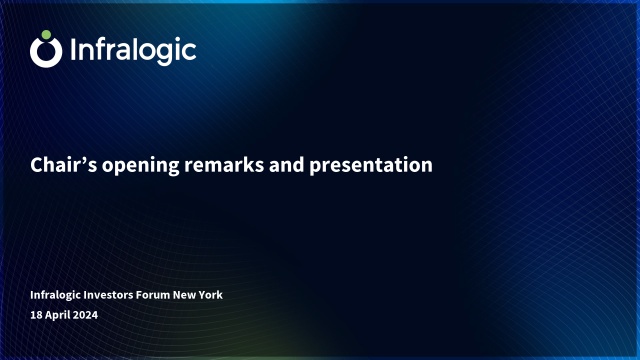 play_arrow
play_arrow






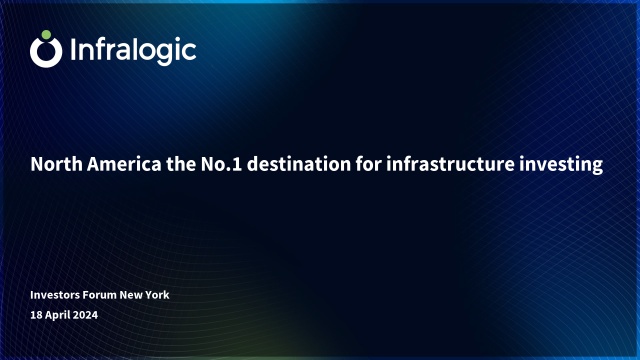 play_arrow
play_arrow

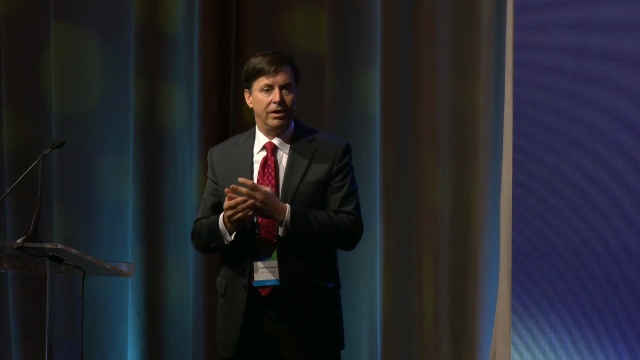 play_arrow
play_arrow







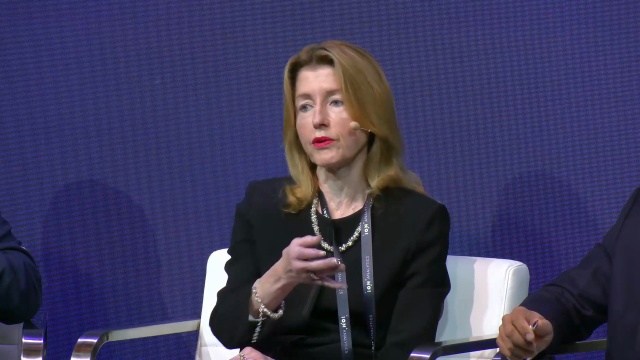 play_arrow
play_arrow







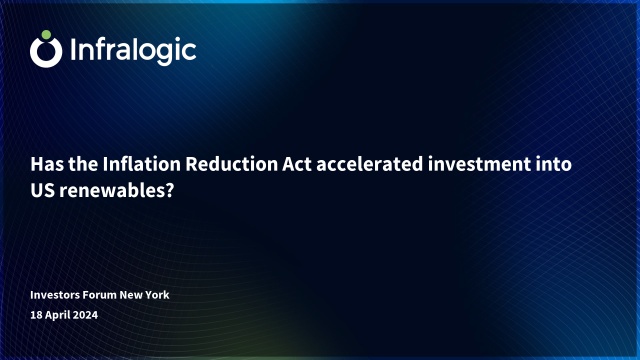 play_arrow
play_arrow






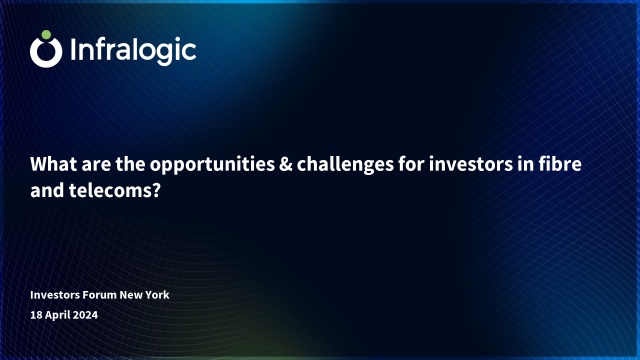 play_arrow
play_arrow






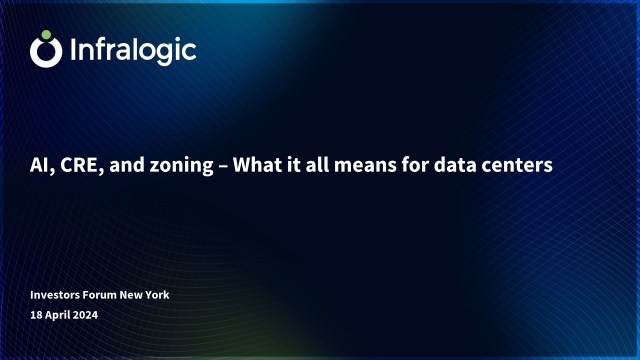 play_arrow
play_arrow






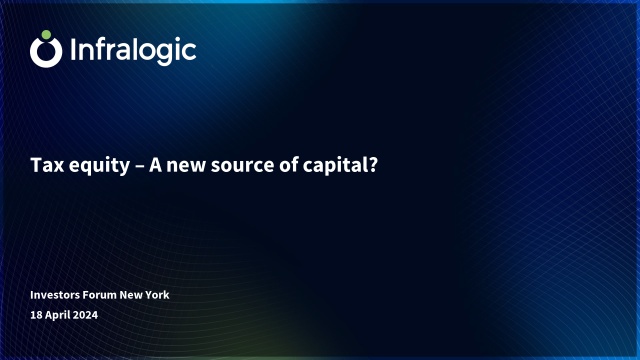 play_arrow
play_arrow





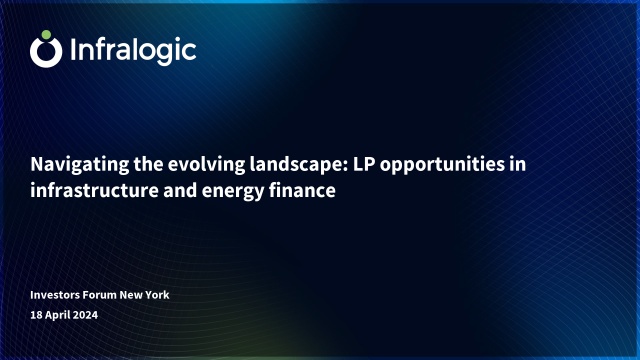 play_arrow
play_arrow





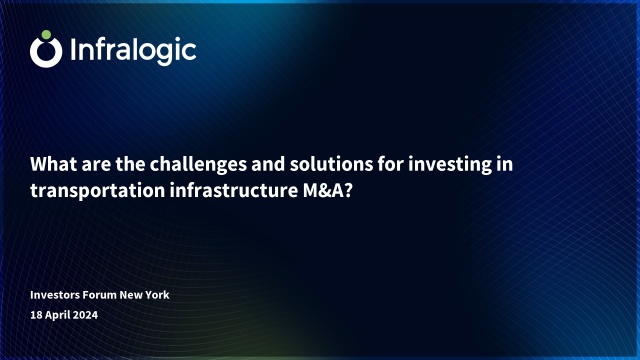 play_arrow
play_arrow

 play_arrow
play_arrow















































